新目标人教版八年级英语下册Unit3学案资料讲解
- 格式:doc
- 大小:125.51 KB
- 文档页数:4
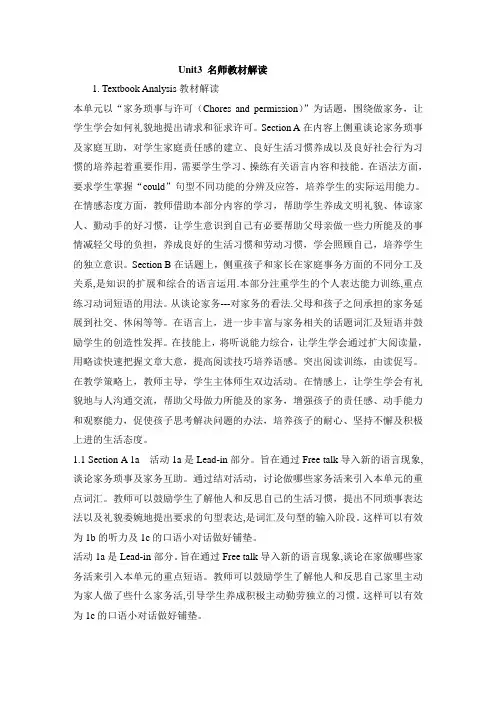
Unit3 名师教材解读1. Textbook Analysis教材解读本单元以“家务琐事与许可(Chores and permission)”为话题,围绕做家务,让学生学会如何礼貌地提出请求和征求许可。
Section A在内容上侧重谈论家务琐事及家庭互助,对学生家庭责任感的建立、良好生活习惯养成以及良好社会行为习惯的培养起着重要作用,需要学生学习、操练有关语言内容和技能。
在语法方面,要求学生掌握“could”句型不同功能的分辨及应答,培养学生的实际运用能力。
在情感态度方面,教师借助本部分内容的学习,帮助学生养成文明礼貌、体谅家人、勤动手的好习惯,让学生意识到自己有必要帮助父母亲做一些力所能及的事情减轻父母的负担,养成良好的生活习惯和劳动习惯,学会照顾自己,培养学生的独立意识。
Section B在话题上,侧重孩子和家长在家庭事务方面的不同分工及关系,是知识的扩展和综合的语言运用.本部分注重学生的个人表达能力训练,重点练习动词短语的用法。
从谈论家务---对家务的看法.父母和孩子之间承担的家务延展到社交、休闲等等。
在语言上,进一步丰富与家务相关的话题词汇及短语并鼓励学生的创造性发挥。
在技能上,将听说能力综合,让学生学会通过扩大阅读量,用略读快速把握文章大意,提高阅读技巧培养语感。
突出阅读训练,由读促写。
在教学策略上,教师主导,学生主体师生双边活动。
在情感上,让学生学会有礼貌地与人沟通交流,帮助父母做力所能及的家务,增强孩子的责任感、动手能力和观察能力,促使孩子思考解决问题的办法,培养孩子的耐心、坚持不懈及积极上进的生活态度。
1.1 Section A 1a 活动1a是Lead-in部分。
旨在通过Free talk导入新的语言现象,谈论家务琐事及家务互助。
通过结对活动,讨论做哪些家务活来引入本单元的重点词汇。
教师可以鼓励学生了解他人和反思自己的生活习惯,提出不同琐事表达法以及礼貌委婉地提出要求的句型表达,是词汇及句型的输入阶段。
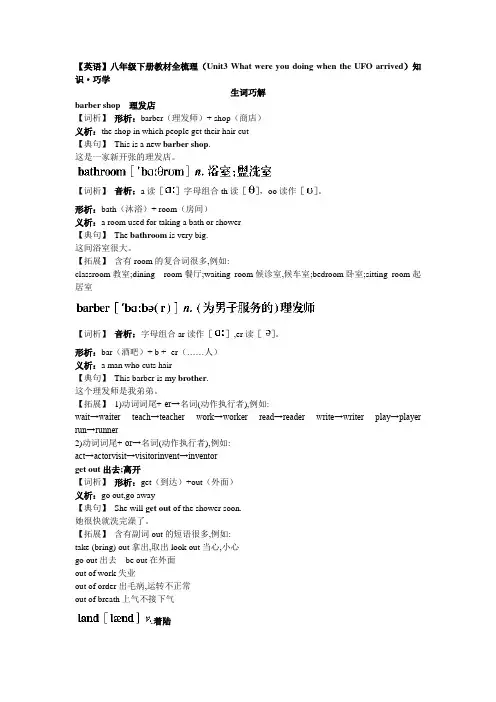
【英语】八年级下册教材全梳理(Unit3 What were you doing when the UFO arrived)知识·巧学生词巧解barber shop理发店【词析】形析:barber(理发师)+ shop(商店)义析:the shop in which people get their hair cut【典句】This is a new barber shop.这是一家新开张的理发店。
【词析】音析:a读[]字母组合th读[],oo读作[]。
形析:bath(沐浴)+ room(房间)义析:a room used for taking a bath or shower【典句】The bathroom is very big.这间浴室很大。
【拓展】含有room的复合词很多,例如:classroom教室;dining room餐厅;waiting room候诊室,候车室;bedroom卧室;sitting room起居室【词析】音析:字母组合ar读作[],er读[]。
形析:bar(酒吧)+ b + -er(……人)义析:a man who cuts hair【典句】This barber is my brother.这个理发师是我弟弟。
【拓展】1)动词词尾+-er→名词(动作执行者),例如:wait→waiter teach→teacher work→worker read→reader write→writer play→player run→runner2)动词词尾+-or→名词(动作执行者),例如:act→actorvisit→visitorinvent→inventorget out出去;离开【词析】形析:get(到达)+out(外面)义析:go out,go away【典句】She will get out of the shower soon.她很快就洗完澡了。
【拓展】含有副词out的短语很多,例如:take (bring) out拿出,取出look out当心,小心go out出去be out在外面out of work失业out of order出毛病,运转不正常out of breath上气不接下气.着陆【词析】音析:land为闭音节词,字母a读作[]。
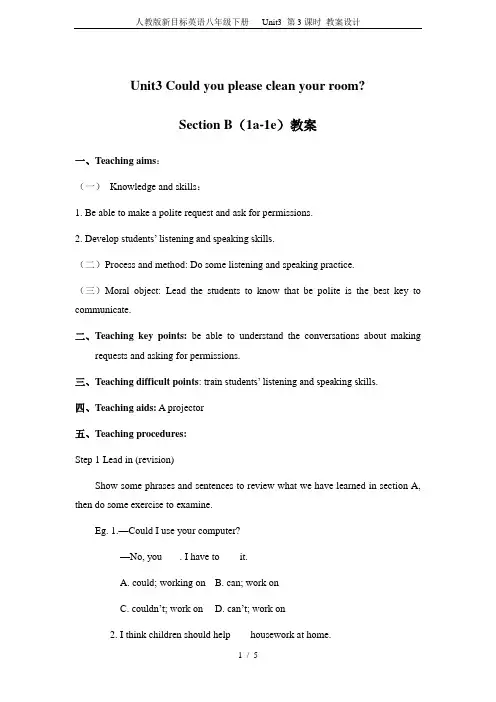
Unit3 Could you please clean your room?Section B(1a-1e)教案一、Teaching aims:(一)Knowledge and skills:1. Be able to make a polite request and ask for permissions.2. Develop students’ listening and speaking skills.(二)Process and method: Do some listening and speaking practice.(三)Moral object: Lead the students to know that be polite is the best key to communicate.二、Teaching key points:be able to understand the conversations about makingrequests and asking for permissions.三、Teaching difficult points: train students’ listening and speaking skills.四、Teaching aids: A projector五、Teaching procedures:Step 1 Lead in (revision)Show some phrases and sentences to review what we have learned in section A, then do some exercise to examine.Eg. 1.—Could I use your computer?—No, you ___. I have to ___ it.A. could; working onB. can; work onC. couldn’t; work onD. can’t; work on2. I think children should help ___ housework at home.A. toB. withC. forD. of3. Could you please _________ (make)your bed.4. Mary______ (make) her bed every day.5. Look! my mother ____________ (fold) the clothes6. He _______ (sweep)the floor and _______ (take) out the rubbish yesterday . Step 2 Presentation1. learn new words: listen to the tape.2.lead inLo ok at the pictures and ask students “What do your parents ask you to do?” and What do you ask your parents’ permission for?上图是图片导入3.activities 1aLet students know what they should do in this part. Say, look at items on the list. Some of these things only parents usually ask and some of them only teenagers usually ask. Ask students to complete the writing on their own books. Remind the students to write “parents” after each item parents ask teenagers to do, and write “teenagers” after each item teen agers ask their parents to do.Check the answers and try to remember these phrases.1.buy some drinks and snacks2. borrow some money3. clean your room4. invite my friends to a party5. go to the store6. use your CD player7. take out the rubbish8. make your bed4. Teach activity 1bThis activity provides guided oral practice using the target language.Point out the sample conversation, ask students to read it. Then make their own conversations by using the phrases in 1a.Parent: Could you please…?Child: Yes, sure. / Sorry, I can’t. I have to ...clean your roomtake out the rubbishChild: Could I …?Parent: Yes, you can. / No, you can’t. You ...buy some drinks and snacksborrow some moneyinvite my friends to a partygo to the storeStep 3 listening Practice1.Teach activity 1cRead the instructions. Point to the items in 1a. Say, listen to the conversation between Sandy and her mom. Please check each item they talked about.Play the recording for twice. Then correct the answers.2.Teach activity 1dThis activity gives students practice in understanding and writing the target language. Say, this time you have to write what the three people are going to do.Play the recoding again. Let students finish this part. Then correctthe answers.Step 4 Consolidation: teach activity 1eThis activity provides guided oral practice using the target language. imagine, one student has the party and ask for help to do chores. And then try to write on the paper.Step 5 SummaryIn this period, we have mainly done some listening and speaking practice to consolidate the target language. Through the practice, we also developed our listening and speaking skills.Step 6 Homework1.Remember the words and phrases in 1a.2.To preview the e-mail message on P22, finish 2c,2d.。
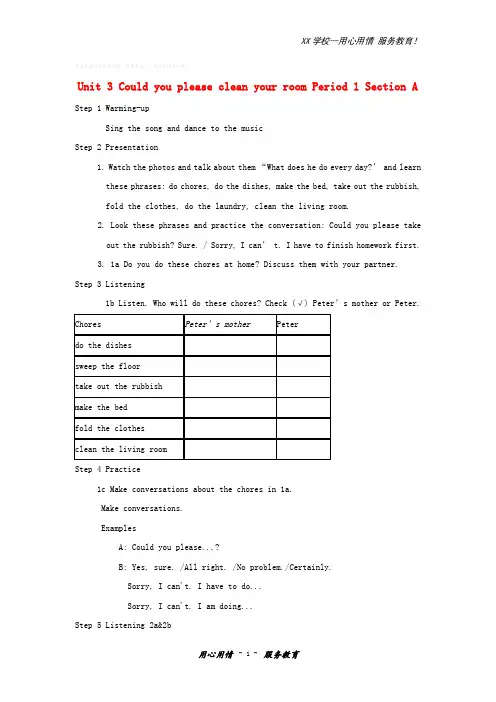
精品基础教育教学资料,请参考使用,祝你取得好成绩!Unit 3 Could you please clean your room Period 1 Section A Step 1 Warming-upSing the song and dance to the musicStep 2 Presentation1. W atch the photos and talk about them “W hat does he do every day?’ and learnthese phrases: do chores, do the dishes, make the bed, take out the rubbish,fold the clothes, do the laundry, clean the living room.2. Look these phrases and practice the conversation: Could you please takeout the rubbish? Sure. / Sorry, I can’ t. I have to finish homework first.3. 1a Do you do these chores at home? Discuss them with your partner.Step 3 Listening1b Listen. Who will do these chores? Check (√) Peter’s mother or Peter.Step 4 Practice1c Make conversations about the chores in 1a.Make conversations.ExamplesA: Could you please...?B: Yes, sure. /All right. /No problem./Certainly.Sorry, I can't. I have to do...Sorry, I can't. I am doing...Step 5 Listening 2a&2bPeter asks his father if he can do four things. What does his father say? Check (√) “yes” or “no”. Listen again. Draw lines to the reasons.Step 6 Practice2c Make conversations using the information in 2a and 2bA: Could I use your computer?B: Sorry. I’m going to work on it now.A: Well, could I watch TV?B: Yes, you can. But first you have to clean your room?2d Role –play the conversationStep 7 Language points and summary1. help out 动词短语,表示在某人繁忙或遇到困难时“给予帮助”。
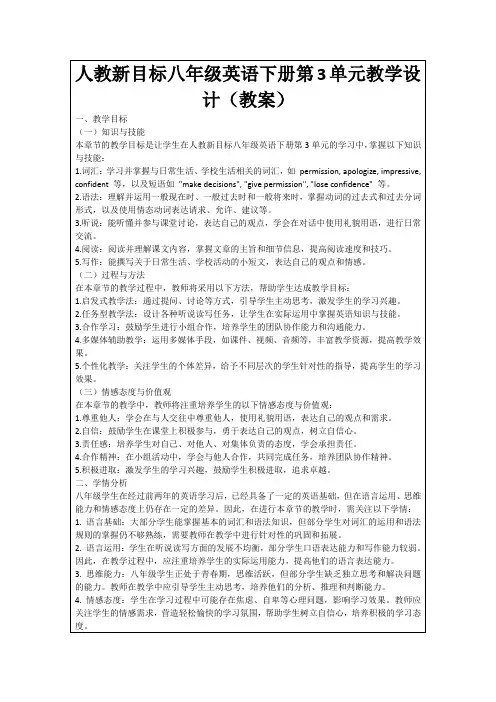
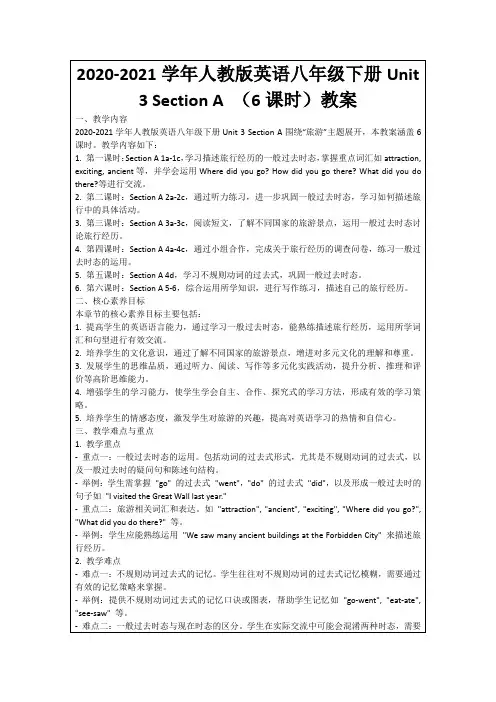
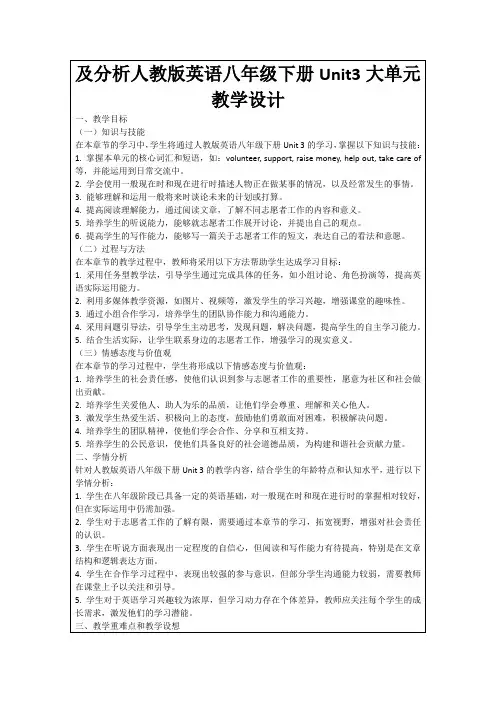
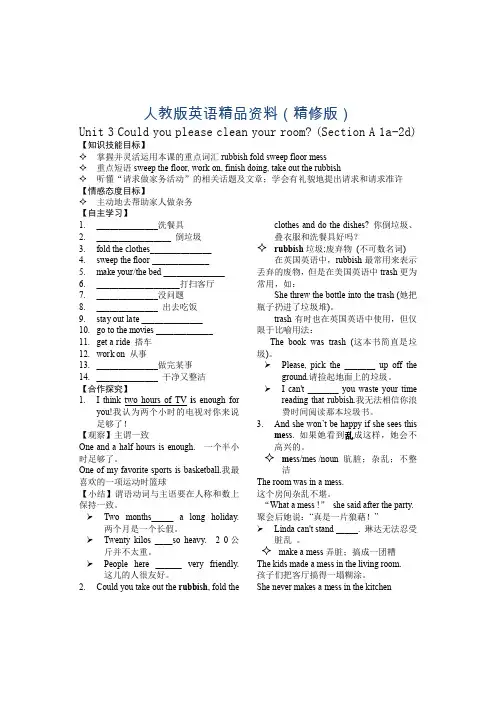
人教版英语精品资料(精修版)Unit 3 Could you please clean your room? (Section A 1a-2d) 【知识技能目标】✧掌握并灵活运用本课的重点词汇rubbish fold sweep floor mess✧重点短语sweep the floor, work on, finish doing, take out the rubbish✧听懂“请求做家务活动”的相关话题及文章;学会有礼貌地提出请求和请求准许【情感态度目标】✧主动地去帮助家人做杂务【自主学习】1.______________洗餐具2._________________ 倒垃圾3.fold the clothes______________4.sweep the floor _____________5.make your/the bed ______________6.___________________打扫客厅7.______________没问题8.______________ 出去吃饭9.stay out late ______________10.go to the movies _____________11.get a ride 搭车12.work on 从事13.______________做完某事14.______________ 干净又整洁【合作探究】1.I think two hours of TV is enough foryou!我认为两个小时的电视对你来说足够了!【观察】主谓一致One and a half hours is enough. 一个半小时足够了。
One of my favorite sports is basketball.我最喜欢的一项运动时篮球【小结】谓语动词与主语要在人称和数上保持一致。
Two months_____ a long holiday.两个月是一个长假。
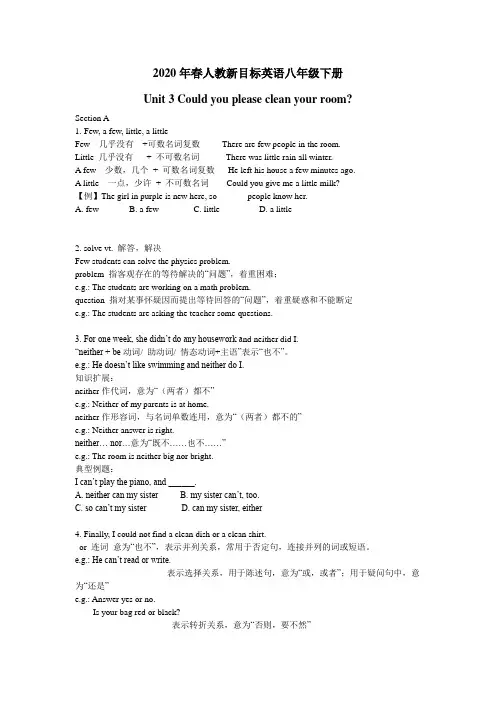
2020年春人教新目标英语八年级下册Unit 3 Could you please clean your room?Section A1.Few, a few, little, a littleFew 几乎没有+可数名词复数There are few people in the room.Little 几乎没有+ 不可数名词There was little rain all winter.A few 少数,几个+ 可数名词复数He left his house a few minutes ago.A little 一点,少许+ 不可数名词Could you give me a little milk?【例】The girl in purple is new here, so ______ people know her.A. fewB. a fewC. littleD. a little2. solve vt. 解答,解决Few students can solve the physics problem.problem 指客观存在的等待解决的“问题”,着重困难;e.g.: The students are working on a math problem.question 指对某事怀疑因而提出等待回答的“问题”,着重疑惑和不能断定e.g.: The students are asking the teacher some questions.3. For one week, she didn’t do any housework a nd neither did I.“neither + be动词/ 助动词/ 情态动词+主语”表示“也不”。
e.g.: He doesn’t like swimming and neither do I.知识扩展:neither作代词,意为“(两者)都不”e.g.: Neither of my parents is at home.neither作形容词,与名词单数连用,意为“(两者)都不的”e.g.: Neither answer is right.neither… nor…意为“既不……也不……”e.g.: The room is neither big nor bright.典型例题:I can’t play the piano, and ______.A. neither can my sisterB. my sister can’t, too.C. so can’t my sisterD. can my sister, either4. Finally, I could not find a clean dish or a clean shirt.or 连词意为“也不”,表示并列关系,常用于否定句,连接并列的词或短语。
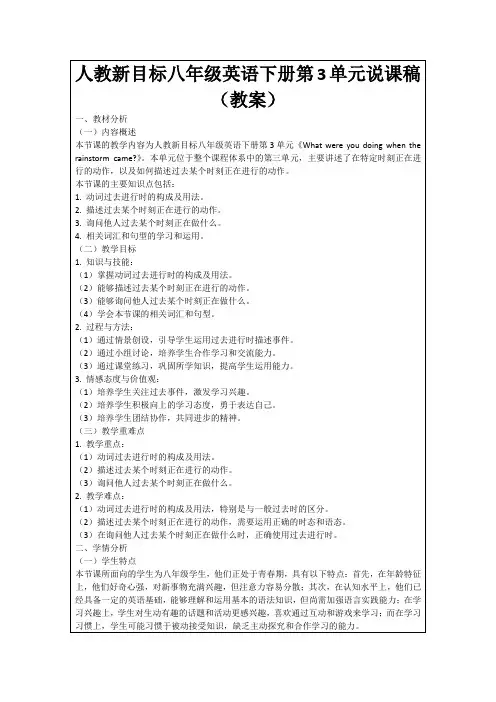
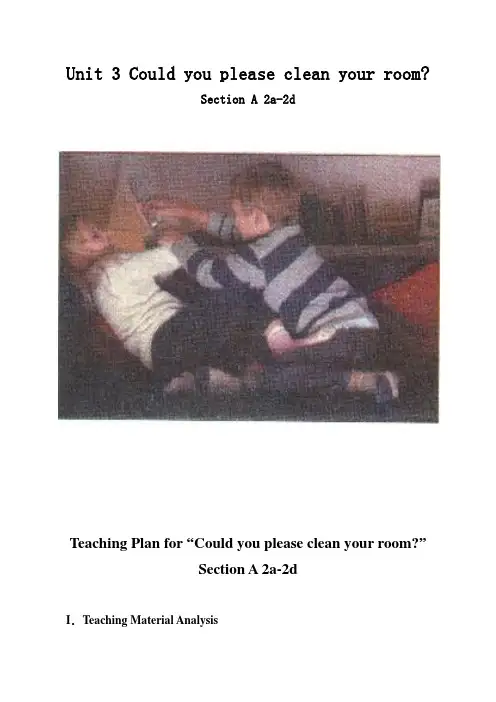
Unit 3 Could you please clean your room?Section A 2a-2dTeaching Plan for “Could you please clean your room?”Section A 2a-2dI.Teaching Material AnalysisIn this period, students should know how to ask for permission. And after doing some listening practice, students should be given opportunity to practice a longer conversation using the target language.II.Students AnalysisStudents have learnt some Modal verbs such as can, may, should. And it’s good for them do know the use of “could”. However, they always do nothing at home but their parents do everything for them. So it’s important to teach them to make polite requests and ask for permission politely.III.Demands from English Curriculum StandardsAccording to English Curriculum Standards, English teaching should help students to develop for their whole life. Students are the hope of the future and they are under the task to make the world improved. So knowing how to make polite requests and ask for permission politely is important for the students. And know how to do something good for our society is also important for them.IV.Teaching objectives1.Knowledge objective:Students will be able to tell the meanings of important phrases including help out with sth., at least, take out the rubbish, fold the clothes, do the dishes, etc.2. Ability objectives: Students will be able to①know how to solve some problems with their partners.② make new conversations with the target language.3. Moral objectives: Students will able to①love and do something good for our society.② develop a sense of groupwork.V.Special teaching and learning methodsTask-based method; self-dependent and cooperative learningVI. Teaching proceduresThanks! Have a good day☺。
Unit 3 What were you doing when the UFO arrived ?Section A (1a—2c)一,背景新目标初中英语教材采用任务型语言教学(TASK-BASED LANGUAGE TEACHING)模式,融会话题、交际功能和语言结构,形成一套循序渐进的生活话的学习程序。
以学生语言技能、语言知识、情感态度、学习策略和文化意识的发展为基础,培养学生英语综合语言运用能力。
强调从学生的学习兴趣、生活经验和认知水平出发,倡导学生体验、实践、参与和交流来中发展学生的综合语言运用能力。
增加了情感因素、学习策略以及文化意识和跨文化交际能力等方面,体现了以人为本的教育观念,培养学生的终生学习能力,培养学生健全的人格和技能发展能力,提到了教育成功的核心。
任务型的教学模式,其过程应该形成一种师生交往、积极互动、共同发展的过程。
应该形成一种民主、开放的课堂教学氛围。
让学生在教师的指导下,通过感知、体验、实践、参与和合作等方式,实现任务的目标,感受成功。
在学习过程中进行情感和策略调整,以形成积极的学习态度,促进语言实际运用能力的提高。
二、教材分析本单元教学以“不明飞行物到达时你在做什么?”导入,围绕“谈论过去发生的事情”这个这个话题展开教学,引导学生通过学习本单元的语言素材看图说话、句型操练、实际描述、对话表演,使学生学会用英语讲故事。
这个话题贴近学生的生活,让他们有话可说。
本单元的教材特点是话题集中,但句型不多。
主要语法内容为when 引导的时间状语从句及过去进行时。
我选取的是本单元的第一个课时,本课出现了大量的地点名词(短语);一些实意动词;学习过去进行时及when和while 的用法。
三、教学方法用计算机辅助教学,以任务型教学法为主体,以小组活动,两人协作为依托。
以游戏、听力、口头练习和笔头练习为载体开展教学。
根据材料的信息,课后完成小短文来检查巩固这节课的知识。
四、教学内容及过程教学目标: 1. Master the key words and phrases .2. Learn to talk about the past events.3. Learn to tell a story using the past and past progressive tense.教学重难点:1.Learn to talk about the past events, using the target language.2.Master the same and differences between when and while.3.Can talk about things and tell stories by using the past andpast .progressive tense.情感目标: 1.Raise the students’ curiosity and interest in science by talking about The UFO.2. Encourage them to explore the unknown world.教学准备:CAI Tape recorder教学过程:(Procedure)Step 1Lead inHello, everyone ! Did you have a good time last weekend ? Were there something new things in your weekend holiday life ?Last Saturday evening , I went to Guangzhou for shopping . Do you know what happened?(板书happen 发生) An unusual object flew in the sky .Can you guess what it is ? And then what happened ? Do you want to know? Now let’s see a short video.Step 2 Presentation1.Show the video again for the class , and teach new words:UFO (Unidentified Fly Object 不明飞行物飞碟)n.alien (外星人)n.land (登陆)v.3.Play the tape,listen and order these statements[1-5], then read thesentences.4.Now let’s see where alien was going .(Present new phrases and sentencestructures.)Show 6 pictures of real situation about where the alien was. Teach new vocabulary and sentence structures.A: Where was the alien?(point to picture 1)B: It was in the bathroomA: Where was the alien?(picture2)B: It was in the kitchen(lead student say other pictures, and at the same time write these new phrases on the blackboard ).Students finish 1a.Read these vocabulary after the teacher ,then students read together.[Can you ask and answer like me ?(point the big scream, let students practice above dialogues)]5. Later, I did a survey about where my friends were when the UFO arrived?1. cut hair (Lucy) in a barber shop2.Cook dinner(Kate) in the kitchen3. cut hair(Tom) in the barber’s chair4.Sleep (Jim) in the bedroom5. Talk on the phone (Allen) in front of library6. Take a shower(Tina) in the bathroomPresent (lead student say)A:Where was Lucy when the alien landed?B: She was in the barber’s shop when the alien landed.(practice other people as this)A: And what was Allen doing when the alien landed?B: He was talking on the phone in front of the library when the alien landed.(lead student say out others like this)Sum up: past progressive tense ( was/were + doing) 过去某一时刻或某一时段正在进行的动作。
Unit 3 Could you please clean your room?Section A ( 1a- 2d) 导学案学习目标:1.熟读本课单词: rubbish, fold, sweep-swept, floor, mess2. 词汇:do the dishes, take out the rubbish, fold the clothes, sweep the floor, make the bed,clean the living room, no problem, come over, clean up the kitchen, go out for dinner, go to the movies, stay out late, get a ride, work on, have to do, need to do, get something to drink, help out with, at least, finish doing,be enough for you, be back from shopping3. 句型:Could you please sweep the floor? Yes, sure.Could I watch TV? Yes, you can.Could you please help out with a few things?I think two hours of TV is enough for you.She won’t be happy if she sees this mess.课前预习:一、请在书本17,18和98, 99页划出学习目标里的词组以及句型。
三、单项选择。
1. For kids of this age, two hours of sitting in a classroom ______ too long.A. isB.areC. wasD.were2. He used to return home ______ once a year, but hasn't been back for almost three years now because of the hard job in a crayon factory.A. at leastB. at lastC. at mostD. at first3. —Could you take out the rubbish and do the dishes, Tony?—Sure. Mom will be mad if she sees this ______, I think.A. matterB. messC. troubleD. difficulty4. —Can you come to my birthday party tonight?—Yes, I'd love to. But I have to finish ______ my English homework first.A. doingB. to doC. doesD. do四、根据汉语意思完成英语句子,每空一词。
Unit3 What were you doing when the UFO arrived?学案Section A Period One知识目标:barber shop理发店get out 出去,离开take off起飞sleep late睡过头land 降落in front of 在…前面句型:1. What were you doing when the UFO arrived?2. The boy was walking down the street when the UFO landed.3.While the girl was shopping, the alien got out.理解:过去进行时的含义:表示过去某一时刻或某一段时间正在进行或发生的动作。
其结构:主语+be动词的过去式(was\were)+其它.能力目标:1.理解并能正确运用过去进行时态表达过去正在发生事情。
2.能区别以when 和while引导的时间状语从句:表示过去一个动作发生时,另一个动作正在进行,持续时间长的动作用过去进行时,常用while引导时间状语从句。
必做题I 英汉互译1.在图书馆前面______________________ 2.讲电话______________________3.理发______________________4.睡过头______________________5.get out of the shower______________________ 6. land on ______________________7. take off ______________________ 8. barber shop______________________ II. 根据句意及首字母提示完成单词1.My mother is cooking in the k____________.2.--- Who is taking a shower in the b____________.--- My brother.3. There is only one bed in my b____________.4. Your hair is too long. I think you should go to the b____________ shop.5. The plane l____________ safely this morning.选做题III . 用所给词的适当形式填空1.He__________ (sleep ) late when it arrived.2. What was the girl doing when the UFO__________ (take) off?3. When I __________(arrive) in Shanghai, it was dark.4. Tom __________(read) a book at 8:00 last night.5. While the alien __________(visit) the museum, the boy called the TV station.IV.完成句子。
Unit 3 Could you please clean your room?Period 1 Section A 1a-2d【导学目标】1.Master the key words and sentences:(1) Key words:rubbish, fold, sweep, floor, mess(2)Sentences:Could you please clean the floor?Can I use your computer?I think 2 hours of TV is enough for you!She won’t be happy if she sees this mess.2.Learn to talk about abilities.Ⅱ. Teaching Key Points and Difficult Points1.Master the key words and expressions.2.Master the use of structure “Could...?”.【导学过程】Step1.Lead-in (3 minutes)Free talk:T:I usually wash clothes at home.What about you?What do you usually do at home? S:...T:Do you often help your parents do the dishes?S:...T:What do you often do to help your parents?S:...Step 2.Presentation: look and say (5 minutes)1. Show some pictures and teach the new words and sentences.2.Let the students read the new words and remember them.3.Have a chant to consolidate the new words.Step 3.Activity 1a(5 minutes)1.Have students look at the pictures in Part 1a on the screen.Discuss the chores with partners.2.Ask the students to show their dialogues.3.Play a game:memory test. Ask students to speak out answers together.Step 4. Activity 1b (4 minutes)1.Have the students read the instructions and know how to do them.2.Play the tape for two times.The first time, ask students to listen carefully and write the answers.The second time,listen and check the answers.3.Follow the tape. Let students pay attention to the pronunciation and intonation. Step 5.Activity 1c (3 minutes)1.Give students enough time to practice the conversations about 1a.2.Ask them to make their own conversations. For example:A: Could you please sweep the floor ?B: Yes,sure. Can you do the dishes?C: Well, could you please do them? I’m going to clean the living room.D: No problem.Step 6.Activity 2a and 2b (5 minutes)1.Get the students have a quick look at the instructions of these two activities, so they can know how to do them.2.Play the recording the first time for the first time to get the main idea.3.Play it again for then to complete the sentences in 2b.4.Check the answers.5.Follow the tape.Step 7.Activity 2c (3 minutes)1.Work in pairs to talk about chores.2.Invite several pairs to act out their conversations.Step 8. Activity 2d (7 minutes)3.1.Role play the conversation and think about what others would like to say to you and try to make the conversations. Please begin with: Could you please …?2.Read after the tape,pay attention to the pronunciation and intonation.4.Ask students to make a report like this:Hello! I’m … In my group, … does the dishes and cleaning._______________________________________________________________________________ _______________________________________________________________________________ _____ .We think ... is the most able one at home.5.Explain some language points.Step 9. Summary (2 minutes)Let the students think about what we have learned in the period.Step 10. Exercises (8 minutes)Let the students finish the exercises to consolidate what we have learned today. 【探究归纳】1.Could you please take out the rubbish?take out 拿出来, 取出来He took a dictionary out. 他拿出来一本字典。
Unit 3 Could you please clean your room Section A第1课时(1a-2d)Section A单词rubbish n.垃圾;废弃物 fold v.折叠;对折 sweep v.(swept)扫;打扫floor n.地板 mess n.杂乱;不整洁 throw v.(threw)扔;掷neither adv.也不; pron.两者都不 shirt n.衬衫 pass v.给;递;走过;通过borrow v.借;借用 lend v.(lent)借给;借出 finger n.手指hate v.厌恶;讨厌while conj.与……同时;当……的时候;而;然而chore n.杂务;乏味无聊的工作 snack n.点心;小吃;快餐短语take out the rubbish 倒垃圾 all the time频繁;反复as soon as 一……就……句型1.Peter,could you please take out the rubbish? 彼得,你能把垃圾倒了吗?2.And she won’t be happy if she sees this mess.而且如果她看到这么乱,她会不高兴的。
3.Could I at least finish watching this show?至少等我看完这个节目可以吗?4.For one week, she did not do any housework and neither didI.在—周时间里,她没有做任何家务,我也没有做。
5.I’ll finish my homework while you help me with the dishes.当你帮我洗碗的时候,我会完成家庭作业。
Section B 单词stress n.精神压力;心理负担waste n.浪费;垃圾 v.浪费;滥用provide v.提供;供应anyway adv.而且;加之depend v.依靠;信赖develop v.发展;壮大fairness n.公正性;合理性since conj.因为;既然 prep.,conj.& adv.从……以后;自……以来neighbor(=neighbour) n.邻居ill adj.有病;不舒服drop v.落下;掉下fair adj.合理的;公正的unfair adj.不合理的;不公正的snack n.点心;小吃;快餐independence n.独立independent adj.独立的;自主的短语in order to目的是;为了 depend on 依靠;信赖a waste of time浪费时间 take care of 照顾;处理句型1.Could I invite my friends to a party? 我能邀请我的朋友们参加聚会吗?2.They should spend their time on schoolwork in order to getgood grades and get into a good university.为了取得好成绩并考入一所好大学,他们应该把时间花在学业上。
Unit 3 Could you please clean your room?一、What do parents ask their teenagers to do?(2 x 8)1. 洗餐具_________________________2. 倒垃圾___________________________3. 叠衣服_________________________4. 扫地___________________________5. 铺床_________________________6. 打扫厨房__________________________7. 带狗出去遛遛____________________ 8. 分担家务_________________________二、What do teenagers ask their parents’ permission for? (2x 8)1. 和朋友外出吃饭_____________________2. 使用CD播放机______________________3. 晚归________________________4. 搭便车____________________________5. 和朋友出去玩_______________________6. 邀请朋友来参加聚会___________________7. 向父母借钱_________________________ 8. 买一些饮料和零食_________________________三、other phrases (2 x 8)1. 惊讶地___________________________2. 讨厌做某事__________________________3. 把盐递给我_______________________4. 有压力_______________________________5. 浪费时间__________________________6. 做某事是不够的_______________________7. 介意做某事________________________ 8. 理解公平的概念________________________四、Sentences(3 x 17)1. —你能借点钱给我吗?—嗯,你要多少?用来做什么?–________________________ me some money?–Hmm. ___________ do you need? And ___________?2. —可以至少让我看完这个电视节目吗?—不行。
我认为你看两小时电视够多了!–Could I ___________ finish __________ this show?–No. I think two hours of TV ___________________!3. 妈妈买完东西随时会回来。
如果她看到这么乱会生气的。
Mom will _______________ shopping _________________. And she won’t be happy if _______________.4. Peter的妈妈得在奶奶来之前打扫好客厅。
Peter’s mom _________________________ before his grandma _______________.5. 我刚刚做到电视前面,妈妈便走了过来。
__________________ I sat down in front of the TV, my mom came over.My mom came over __________________ I sat down in from of the TV.6. Nancy成天看电视,在家从来不帮忙。
Nancy watches TV ____________________ and _____________________________________________.7. 整整一周妈妈没有做任何家务,我也不做。
For a week, mom ______________________________________, and _____________________________.8. 第二天,妈妈下下班回家发现屋子既干净又整洁。
__________________, my mom came home from work _________________________________________.9. 我不明白为什么一些家长要让他们的孩子在家做家务劳动。
I do not understand_____________________________________________ housework and chores at home.10. 他们应当花时间在功课上,以取得好成绩,考上一所好大学。
They should _________________ schoolwork ________________ get good grades and _______________.11. 他们长大后必须做家务,所以对他们来说,现在没有必要做家务。
When they _____________, they ____________ do housework so _____________________________ now.12. 在家为自己的孩子提供一个干净、舒适的环境是家长们的职责。
It is _______________ to _____________________________________________at home for their children.13. 做些家务琐事可以帮助培养孩子的独立性,教他们如何照顾自己。
_____________ helps to ___________________________and __________________ look after themselves.14. 既然他们与父母同住在一个屋檐之下,他们应该知道每个人都应当尽力保持家里干净整洁。
___________ they live in one house with their parents, they should know that ___________________________________.15. 我们邻居的儿子上了一所好大学,但在他入学的头一年,他却全然不知如何照料自己。
Our neighbor’s son _______________ but during his first year, he ________________________________.16. 结果,他经常生病,成绩下滑。
____________________, he often ______________________ and ________________________________.17. 孩子们越早学会独立,对他们的未来就越好。
_______________ kids learn __________________________, the better ___________________________.Unit 3 Could you please clean your room?二、What do parents ask their teenagers to do?(2 x 8)1. 洗餐具do the dishes2. 倒垃圾take out the rubbish3. 叠衣服fold the clothes4. 扫地 sweep the floor5. 铺床make the bed6. 打扫厨房clean up the kitchen7. 带狗出去遛遛take the dog for a walk8. 分担家务share the housework二、What do teenagers ask their parents’ permission for? (2x 8)1. 和朋友外出吃饭go out for dinner with friends2. 使用CD播放机use the CD player3. 晚归stay out late4. 搭便车get a ride5. 和朋友出去玩hang out with (my) friends6. 邀请朋友来参加聚会invite my friends to a party7. 向父母借钱borrow some money from my parents8. 买一些饮料和零食buy some drinks and snacks三、other phrases (2 x 8)1. 惊讶地in surprise2. 讨厌做某事hate to do3. 把盐递给我pass me the salt4. 有压力have stress5. 浪费时间a waste of time6. 做某事是不够的it is not enough to do7. 介意做某事mind doing sth. 8. 理解公平的概念understand the idea of fairness四、Sentences(3 x 17)1. —你能借点钱给我吗?—嗯。
你要多少?用来做什么?–Could you please lend me some money? –Hmm. How much do you need? And what for?2. —可以至少让我看完这个电视节目吗?—不行。
我认为你看两小时电视够多了!–Could I at least finish watching this show? –No. I think two hours of TV is enough for you!3. 妈妈买完东西随时会回来。
如果她看到这么乱会生气的。
Mom wil l be back from shopping any minute now. And she won’t be happy if she sees this mess.4. Peter的妈妈得在奶奶来之前打扫好客厅。
Peter’s mom has to clean the living room before his grandma arrives.5. 我刚刚做到电视前面,妈妈便走了过来。
The minute I sat down in front of the TV, my mom came over. / My mom came over as soon as I sat down in from of the TV.6. Nancy成天看电视,在家从来不帮忙。